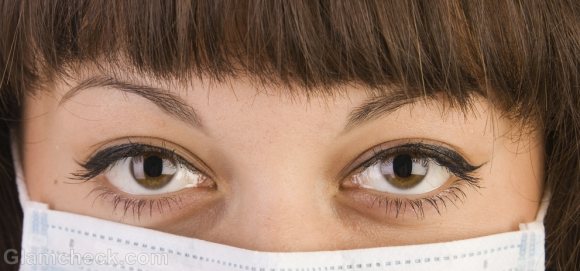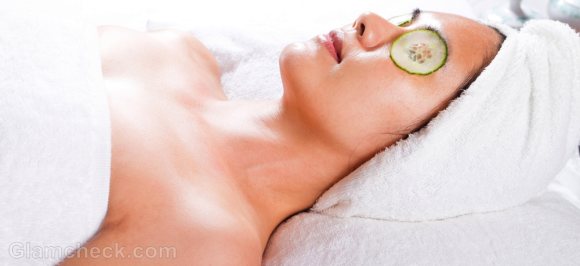We’ve all had those mornings where we wake up with puffy eyes, looking like we haven’t slept in days. Puffy eyes are technically referred to as periorbital (around the eyes) puffiness. A more common term for puffy eyes is bags under the eyes or eye bags.
Symptoms of Puffy Eyes

It’s not tough diagnosing a case of puffy eyes as you can easily recognize this global condition by its rather obvious symptoms.
- The eyes look swollen, and you look like you’ve been crying for hours or haven’t slept a wink all night
- Sometimes, puffy eyes may be accompanied by mild itching.
- Puffy eyes can get very red.
- Puffy eyes can also feel heavy and, well, puffed up.
So should you be seeing a doctor if you encounter these symptoms of puffy eyes? Not really. Usually there is no need to. Most people who are troubled by puffy eyes are quite healthy, and their puffy eyes are not caused by underlying health conditions. If a serious medical problem is indeed the reason for your puffy eyes, then there will be other symptoms as well, and puffy eyes may just be one symptom on a list of many. For example, you may feel pain on the swollen part of the eyes, or there may be a discharge from the eyes. If this is the case, then you should definitely pay your doctor a visit just to be on the safe side.
Causes of Puffy Eyes
The skin around the eyes is particularly thin. Different factors can cause the fluid to collect around the eyes, pushing this thin skin out, and sometimes making the surrounding skin appear dark. Fluid retention is the main cause of puffy eyes. But why does this happen? Following are some of the instances that contribute to fluid retention, plus a few other causes of puffy eyes.
- Stress – both physical and emotional stress can result in puffy eyes. If you have had a very long day and are totally drained, the first place it will show is through your puffy eyes.
- Excessive alcohol intake does not directly cause puffy eyes. But what it does do is alter the hormonal levels in your body and cause high levels of physical stress, which are both causes of puffy eyes.
- Your puffy eyes may be the symptom of an allergy, especially to dust, pollen, or pets.
- Salty foods can cause puffy eyes as the high level of sodium causes your body to retain water, some of which may be retained in the area around the eyes.
- Speaking of salt, crying can give you puffy eyes too since the salt in your tears causes fluid retention as well.
- Erratic sleeping patterns can also cause puffy eyes. You’ve surely noticed that puffy eyes are common when you don’t get enough sleep. But puffy eyes can also occur when you sleep too much or if you change your sleep timings to a considerable extent. For example, changing from a night shift to a day shift at work can mean a total overhaul for the body, causing both physical and mental stress as your body strains to adjust. So expect puffy eyes if you plan on adjusting your body clock.
- Sinus problems can also cause puffy eyes. The fluid and mucus in the nasal cavity can extend to the skin under the eyes.
- Your puffy eyes may indicate the onset of an infection.
- Puffy eyes can be a symptom of hormonal changes.
- If you are recovering from surgery, you may be more prone to puffy eyes since a surgery is very stressful both physiologically and psychologically.
- Toxin build-up in the body due to an unhealthy lifestyle can cause puffy eyes.
- Some medications can have puffy eyes as one of their side effects.
- Falling asleep with your contact lenses on will also result in puffy eyes.
- For some folks, puffy eyes are just genetic and there’s nothing they can do about it.
- Although not quite a cause of puffy eyes, your age will greatly contribute to your vulnerability to the condition, i.e., the older you are, the more likely you are to get them since the skin around the eyes gets thinner with age.
Treatment for Puffy Eyes
When it comes to treating puffy eyes, you must understand that there is no quick fix solution. You have to tackle the cause of your puffy eyes before you see any considerable results. And even the treatment methods you employ to help reduce the puffiness will not show exemplary results. So be realistic in your expectations of treatment for puffy eyes. And make sure to tackle the cause.
For example, if you think your puffy eyes are due to a toxic build-up in your body from years of bad eating habits and pollution, then a detox diet may help. This is safer when done under supervision of a nutritionist. If you know that your puffy eyes are an indication of an allergy, then you can get a hypoallergenic shot and simply stay away from the trigger of the allergic reactions.
There are several eye creams and serums advertised today which claim to be able to banish puffy eyes. The extent to which these products work will vary depending on the severity of puffy eyes, the product used, and the simple fact that cosmetics work differently for different people. These eye creams can be expensive though. So why not try some home remedies and common sense for puffy eyes first before spending your hard-earned money on products that may or may not work.
Home Remedies for Puffy Eyes
 Once upon a time, there were no giant cosmetics companies which could fix or hide all our little flaws. There were, however, people who used the resources at their disposal to come up with their own solutions to puffy eyes and other such problems. Some of those home remedies flopped big time, but others have stood the test of time and are still today the go-to home remedies for puffy eyes. Here are some of the most effective puffy eyes home remedies.
Once upon a time, there were no giant cosmetics companies which could fix or hide all our little flaws. There were, however, people who used the resources at their disposal to come up with their own solutions to puffy eyes and other such problems. Some of those home remedies flopped big time, but others have stood the test of time and are still today the go-to home remedies for puffy eyes. Here are some of the most effective puffy eyes home remedies.
- Splash some ice cold water on your face and pat dry.
- Put a couple of metal spoons in the freezer for about five minutes. Remove and put the back of the spoons against the eyes to reduce swelling.
- Cut potatoes or cucumbers into thin slices and place on eyes.
- Dip two tea bags in water, gently squeeze out a little of the excess water so it’s not dripping, and place one over each eye. This is actually a very effective home remedy for other eye problems as well.
- Drink some water. Fill up a one-liter bottle and just keep sipping. Your puffy eyes will reduce considerably with this method.
There’s a reason that most of these home remedies for puffy eyes are suggesting something cold. The application or exposure to objects of lower temperatures constricts the blood vessels in the skin under the eyes, which prevents fluid from flowing into the tissue, thus reducing the severity of puffy eyes.
Tips to Prevent Puffy Eyes
 Puffy eyes can take some time to disappear. You are stuck looking like a train wreck until they go away. So it makes sense to take steps to prevent puffy eyes, which is not that hard to do. Actually, the preventive measures you take for puffy eyes are the very same that you would employ for better health anyway. This means that your aim for non-puffy eyes can make you live a healthier lifestyle.
Puffy eyes can take some time to disappear. You are stuck looking like a train wreck until they go away. So it makes sense to take steps to prevent puffy eyes, which is not that hard to do. Actually, the preventive measures you take for puffy eyes are the very same that you would employ for better health anyway. This means that your aim for non-puffy eyes can make you live a healthier lifestyle.
- Sleep eight hours a night. You need good sleep, not the tossing-and-turning variety. So you should take steps to ensure that you will sleep like a baby when the lights go out. Take the TV out of the bedroom. Avoid caffeinated beverages too close to bed time. Exercise regularly so that stores of excessive physical energy do not keep you up at night. If you allow yourself to think too much about the problems in your life, then it’s time you learned to manage your stress. Which brings us to the next point.
- Stress is an inevitable contributor to several health problems. So by learning to manage your stress or reducing your participation in activities that do cause you stress, not only will you be preventing puffy eyes you will also be doing your health a huge favor in the long run.
- Drink enough water. When was the last time you actually drank your eight glasses a day? Don’t beat yourself up about it. We’re all too busy nowadays to take care of ourselves. But if you want to avoid puffy eyes, then this is one important preventive measure.
- Reduce your intake of salt. It’s easy to restrict salt if you have a healthy diet abundant in fruits, veggies and whole grains. Packaged and processed foods make up a huge part of the modern diet, and they have phenomenal amounts of sodium and salt. So ban these foods or at least reduce the number of times each week that you indulge in them.
- Don’t forget to remove your contact lenses before going to sleep, no matter how tired you are. You would never sleep with makeup on because you know exactly what hell that will play on your skin. Contact lenses left on while you sleep cause just as much damage to your eyes as makeup does to your skin.
- While we’re on the topic of makeup, try replacing your chemical-based cosmetics and makeup with those that contain natural ingredients. The chemicals in regular makeup and cosmetics can contribute to puffy eyes as any woman who has fallen asleep with mascara can testify to. You may even know a friend who uses a new eye-liner and immediately feels itchy or starts to tear up. That’s all thanks to the plethora of chemicals that are now considered normal in the majority of cosmetic products on the market.
- If you can’t make the switch to natural makeup and cosmetics, at least ensure that you invest in quality products. Avoid the cheap varieties. Also ensure that you throw away any makeup that is more than 3 years old. Don’t forget to keep your makeup brushes clean as bacteria tend to breed on the dirty ones, thus making you a prime candidate for puffy eyes.
- You can also prevent puffy eyes by changing your sleeping position. Use a pillow so that your head is elevated while you sleep. When you sleep without a pillow, gravity naturally pulls the fluid into the sockets and you can wake up with puffy eyes. You can’t beat gravity, but using elevation can help to reduce the severity of puffy eyes by preventing the retention of large amounts of fluid around the eyes.
Image: Shutterstock
